By Ana Rodriguez Soto - The Archdiocese of Miami
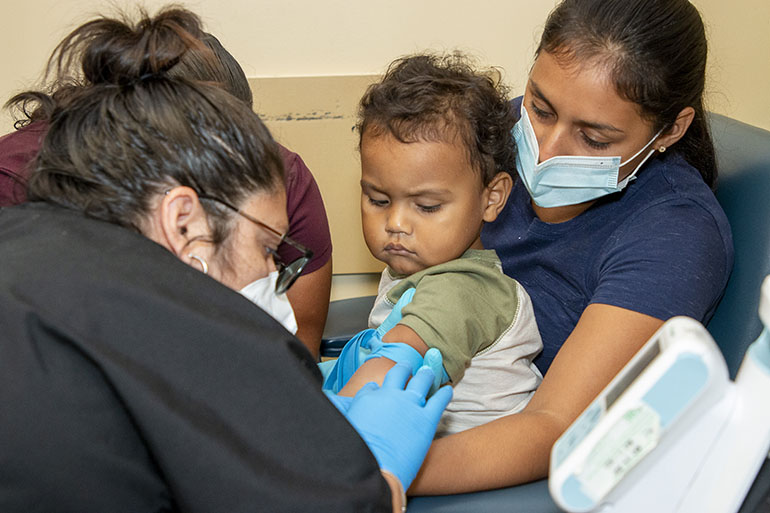
Photographer: ANA RODRIGUEZ-SOTO | FC
Medical assistants Magally Zelaya, front, and Lucelly Diaz prepare to draw blood from a 21-month-old as his mother holds him, July 29, 2022, at Miami's Camillus Health Concern. The family arrived a month earlier from Honduras. Medical staff at the clinic provide vaccines, check-ups, visual and dental services to newly arrived immigrant children regardless of legal status or financial ability.
MIAMI | When people think of Camillus House, they think, primarily, of homeless adults. Ditto for its partner agency, Camillus Health Concern.
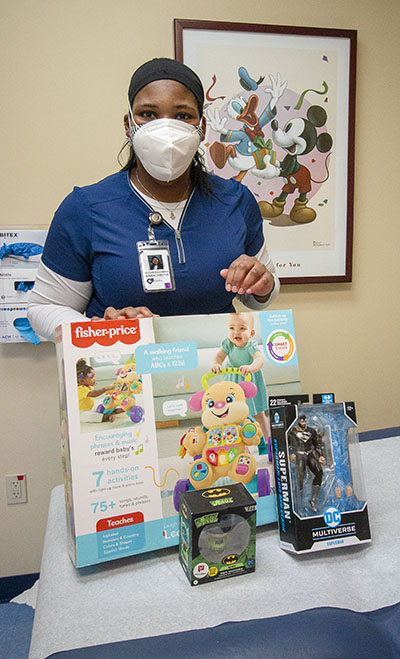
Photographer: ANA RODRIGUEZ-SOTO | FC
Dr. Chandra Jennings, medical director at Miami's Camillus Health Concern, shows some of the toys she gives to her pediatric patients after their visits. Medical staff at the clinic provide vaccines, check-ups, visual and dental services to newly arrived immigrant children regardless of legal status or financial ability.
But Camillus Health’s Good Shepherd center, located at 336 N.W. Fifth Street, provides comprehensive health care, behavioral and social services not only to homeless adults but also to underserved families and children, including the undocumented.
On a recent Friday, the center’s medical staff were conducting physicals and vaccinating children and teenagers in preparation for the start of school. Many of those served that day were recent arrivals from Central America.
“We are a community clinic and we will see anyone – insurance, no insurance, it doesn’t matter. Because our mission is to serve the underserved,” said Dr. Chandra Jennings, Camillus Health’s medical director.
Camillus Health began in 1984 as an outreach to Miami’s homeless, spearheaded by a local Catholic physician, Pedro Jose Greer Jr., the son of Cuban immigrants and a graduate of Miami’s Christopher Columbus High School.
The clinic now serves over 6,000 patients a year, 93% of whom, according to its 2021 annual report, fell below the federal poverty line of $12,880 in individual annual income. The clinic provides them with check-ups, dental and vision care, psychological counseling, management of chronic diseases, medicines, and referrals to other specialists and community agencies, including the Lions Club and Mercy Hospital’s Reach Out Miami Program.
“The pandemic helped us to reach out and develop new partnerships with the community, and to see a new population that needed our services,” Jennings said.
The clinic paused its services to children at the start of the pandemic but resumed them a year later.
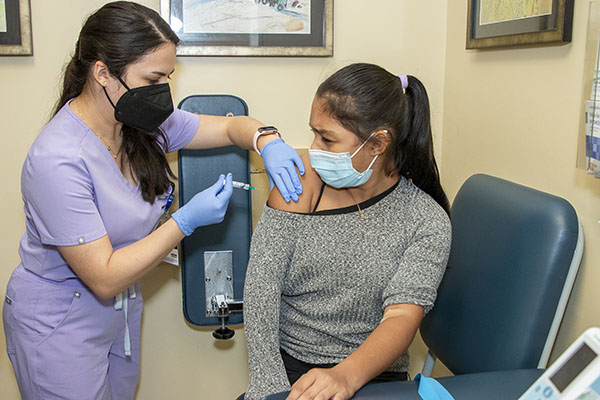
Photographer: ANA RODRIGUEZ-SOTO | FC
Nesli Akinci, a third-year medical student at Nova Southeastern's College of Osteopathic Medicine, vaccinates an 11-year-old who arrived a month earlier from Honduras, July 29, 2022, at Miami's Camillus Health Concern. Medical staff at the clinic provide vaccines, check-ups, visual and dental services to newly arrived immigrant children regardless of legal status or financial ability.
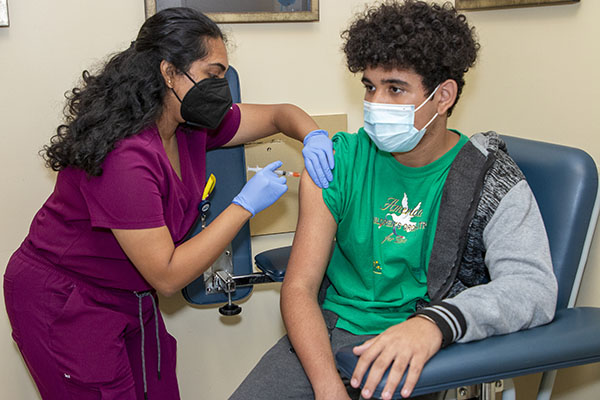
Photographer: ANA RODRIGUEZ-SOTO | FC
Neha Aitharaju, a third-year medical student at Nova Southeastern's College of Osteopathic Medicine, gives her first solo vaccination to a 16-year-old patient at Miami's Camillus Health Concern, July 29, 2022. Medical staff provide vaccines, check-ups, visual and dental services to newly arrived immigrant children regardless of legal status or financial ability.
“Our census is well over 200 kids and it keeps growing every day,” Jennings said. “We usually have a linkage to the family or a close family acquaintance. Our patients who are already here are sometimes our best ambassadors.”
Through word of mouth, families who are undocumented know that Camillus Health is a “safe clinic” for them, she added. “They’re very fearful to enter the system because of their legal status.”
They also know they won’t get a large bill, and most of the time they don’t have to travel very far for a visit, as the clinic is easily accessible to anyone living in Overtown, Allapattah or Little Havana.
The clinic sees children Wednesday evenings from 4 to 7 p.m. and Friday mornings. Walk-ins are accepted but appointments are preferred. The clinic also provides all the pediatric immunizations for children ages 0 to 17.
“Anyone who needs vaccines, we can vaccinate them, and we do it at their convenience,” Jennings said.
Last year, the clinic also began hosting outreach events such as Spooky Vision check-ups around Halloween; Heart Healthy Holiday around Christmas; and Spring into Health around Easter.
The plan is to host similar events this year, said the doctor, who describes herself as a “multigenerational Grovite.” She grew up in Coconut Grove and traces her ancestry to Bahamians who settled there decades ago.
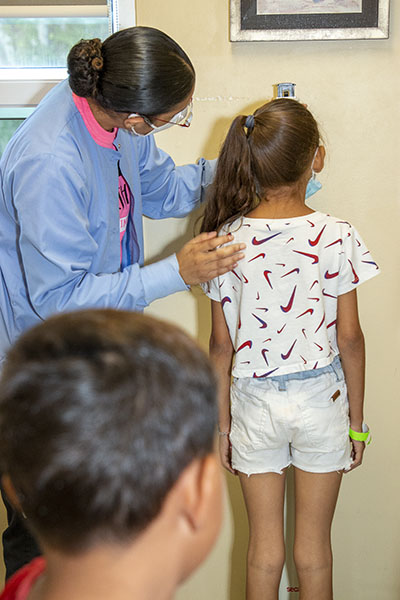
Photographer: ANA RODRIGUEZ-SOTO | FC
A medical assistant at Miami's Camillus Health Concern measures the height and weight of a pediatric patient, July 29, 2022. Medical staff provide vaccines, check-ups, visual and dental services to newly arrived immigrant children regardless of legal status or financial ability.
This is her second year as medical director at Camillus Health. After graduating from Edward Via College of Osteopathic Medicine in Spartanburg, South Carolina, she completed her residency in Pueblo, Colorado, and trained also in Honduras, El Salvador and the Dominican Republic.
“That reinforced my desire to come here and work with the community here,” she said. What she found is that “people who are underserved are always underserved.”
Their problems are similar: lack of access to quality care, financial impediments, and gaps in health literacy – all of them compounded in Miami by the language barriers.
That’s something medical students from Nova Southeastern and Florida International universities learn when they spend a rotation at Camillus Health.
“You kind of have to consider all the extra things,” said Neha Aitharaju, a third-year student at Nova’s Dr. Kiran C. Patel College of Osteopathic Medicine, which focuses on “serving the medically underserved.”
“It’s unlike any other rotation,” Aitharaju said, because dealing with a homeless and underserved population means taking into consideration not just the complexity of the disease but “all the social factors.”
Those include how a diet specific to a culture might affect a chronic health condition, whether patients have access to medication, and their living situation – are there lots of people crowded into a small space, or do they even have a permanent roof over their heads.
“How can you just ignore those factors? You can’t. That comprises the patient’s health,” Aitharaju said. “It’s humbling more than anything.”
Her eight weeks at Camillus Health this summer marked her first time interacting with patients after two years of theoretical learning, much of it online because of the pandemic.
“So it’s exciting,” she said after administering vaccines solo for the first time – in this case, the meningitis shot to two teenagers recently arrived from Nicaragua.
“I love it. It’s really good,” Aitharaju added. “I’ve just been learning as much as I can.”
FIND OUT MORE
- Camillus Health Concern and its Good Shepherd Health Center are located at 336 N.W. Fifth St., Miami. For information, call 305-577-4840 or visit https://camillushealth.org/.
- Appointments can be made by calling 305-341-0152. The clinic is open Mondays, Tuesdays and Thursdays from 8 a.m. to 5 p.m.; Wednesdays from 8 a.m. to 7 p.m.; and Fridays from 8 a.m. to 4:30 p.m.
- Children are seen Wednesdays from 4 to 7 p.m. and Fridays before noon.
- In preparation for the start of the school year, Camillus Health will be conducting the physicals required for first-time entrants in the school system this Friday, Aug. 12, from 8:30 a.m. to 2:30 p.m.
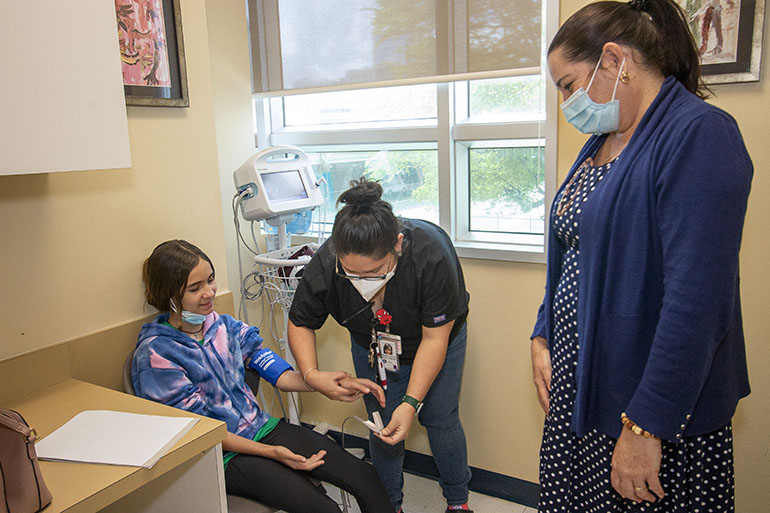
Photographer: ANA RODRIGUEZ-SOTO | FC
Medical assistant Magally Zelaya checks the vitals on an 11-year-old patient who arrived three weeks earlier from Nicaragua as her mother looks on, July 29, 2022, at Miami's Camillus Health Concern. Medical staff at the clinic provide vaccines, check-ups, visual and dental services to newly arrived immigrant children regardless of legal status or financial ability.

